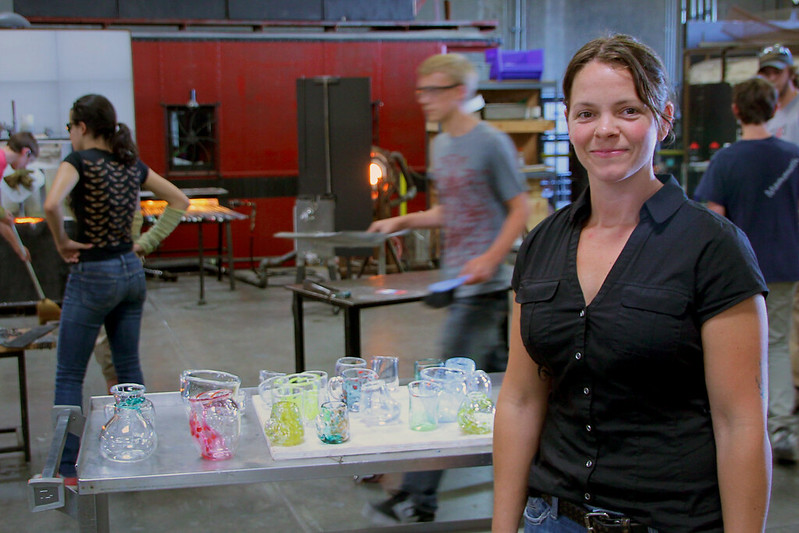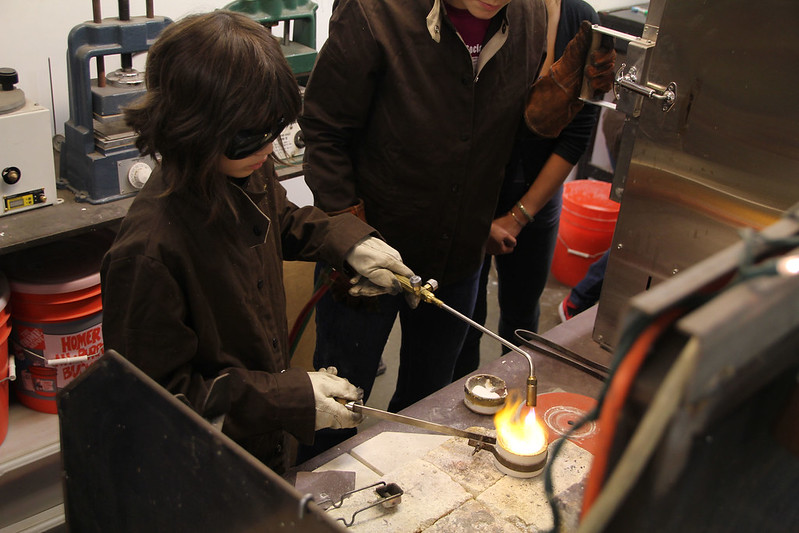Summertime at The Crucible brings one of our most popular youth programs, the Youth Summer Camps. Aaron Mason sat down with Carla Hall, The Crucible’s Youth Program Director, to talk about the program in process. Photos by Troy Mickins and Aaron Mason.
AM: Let’s start with a little background first.
CH: Sure! My name is Carla Hall, and I’m the Youth Program Director, amongst other things (laughing) here at The Crucible.
AM: And right now our big youth project is the Youth Summer Camps?
CH: That’s correct. Right now we’re in our fourth week of our Youth Summer Camp program, which I like to call “an industrial arts day camp.”
AM: How long do the camps run, and what do they provide?
CH: It’s five weeks of week-long day camps that give students a hands-on learning experience in industrial arts. They’re either full or half-day camps, depending on what the students have signed up for, but in either case young people get the chance to participate in huge range of classes including welding, blacksmithing, glass blowing and glass flameworking. This week alone we’re running 22 different classes.
AM: How many young people are we expecting to have through the program?
CH: We have a little over 600 students coming in over the five-week span. Traditionally the camp would span four weeks, but this is the first year we’ve had this level of interest and expanded into a fifth week of our most popular classes.
AM: Which parts of the program have been expanded?
CH: Glass blowing is the program that’s had by far the most growth. Last summer we ran a pilot program for just one week; this summer we’ve done glass blowing in four expanded weeks, and all of those classes have filled. The art bike program has continued to be popular as a day-long program as well. This is the first year we’ve also had the immersion program, which is a day-long experience with beginning and continuing skill level classes in arc welding, glassblowing, glass flameworking and blacksmithing. Those programs also filled pretty early in the registration process, and have seen increased popularity compared to last year
AM: And all of these are programs are for young students? They sound very adult.
CH: Yes! Once a student turns twelve they can come in and get hands on experience with flame or fire arts classes. The eight to eleven year olds participate in programs like clay, kinetics, wood carving, which are generally more age-appropriate.
AM: What do you tell people who are concerned about youth in this environment?
CH: We spend a lot of time transforming the shop into a youth-friendly, youth-safe space, including hiring a program staff who deal with supporting student needs, supporting instructors, providing a central meeting space, a break area, recess space and snack time. They’re doing a fantastic job providing the infrastructure that makes the camp so successful.
We also work to promote maturity and responsibility in our students. We let them know that now that they’re eight they really are mature enough to go through those processes. We set expectations of safety and proper behavior when handling the scenarios they’re faced with. For an eight year old we say things like “You know now you’re eight and you’re not seven, so you should be able to be in this space and be old enough to have fun here and be safe here.” Of course the situations are very safe and age appropriate, but you’d be amazed at how responsive to responsibility young people can be when given the chance.
AM: Do you find that a lot of students are returning from last year?
CH: This year is the first year that we’ve seen a high ratio of returning students. We’ve been running the camps for a number of years, and some students have started to come year after year to have their summer experience or their summer camp at The Crucible. We’ve seen who return to really grow their skills in one area, and some who are returning to expand into other areas and really build out their portfolio.
AM: How are people finding out about the program and getting involved?
CH: A lot of word of mouth. We have students who come for a summer experience and bring their friends with them. We see a lot of siblings coming, a lot of friends groups coming. We have one MIG welding class with four friends who go to the same school. Many of the schools that we work with pass on recommendations for this being a summer experience for their students who are interested in industrial arts. It’s a hands-on experience where students are working with over 2000 degree furnaces and blowing hot glass and hammering hot metal. It’s a pretty unique summer experience that people are excited to share with their friends and family.
AM: What are some of the most interesting things you’ve seen so far?
CH: I continue to be thrilled with the youth internship program. These are returning youth who’ve taken a number of classes in a particular area, and are now working as teacher assistants. It’s amazing to see them really step up and find their voice and own their process, and be able to then teach other students who are coming in.
We also do a gallery walk at the end of each camp week so we have the opportunity to see all of the work that comes out of each class. That excitement around the feeling of completion, that feeling of “I did this. I came in and I was really unsure but then I came in and I stepped up, learned the skills and came out with these beautiful projects” is just amazing to see across the board.
Youth Summer Camps run June through August at The Crucible. For more information contact Carla at carla@thecrucible.org or at 510.444.0191 x112.





